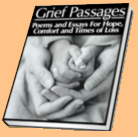| Featured Expert |
| Our featured expert today is
DR. GEORGE F RHOADES, Jr., PhD, a licensed clinical psychologist
and the Director of Ola Hou Clinic in Pearl City, HI.
Dr. Rhoades is an international speaker conducting psychotherapeutic
workshops and seminars in Hawaii, Asia, Continental USA,
and Europe. He is the author of several publications in
the area of Anger Control Training, Sadistic Ritual Abuse,
and Christian Therapy. For more information or to contact
Dr. Rhodes, visit www.anger-management.net |
|
 |
| We invite you to read
some different but parallel ideas on the topic of Some
Thoughts on Rage |
|
|
 |
|
Tell
Your Friends! |
Get
a free copy
of our book! |
|
 |
 |
|
 |
|
| Difficult as it is really to listen
to someone in affliction; it is just as difficult for
him to know that compassion is listening to him. |
|
| Simone Weil, Waiting for
God |
|
|
 |
| Look
what
RESOURCES
We have this week |
 |
|
 |
|
 |
|
|
Forwarding
or republishing information is permitted so long as you
have the following included with your usage:
"National
Grief Support Services gives permission to forward or
reprint information from Grief Matters, so long as it
is not altered, and the following information is included:
Grief Matters is a publication of National Grief Support
Services, ©2004,
GriefSupportServices.org" |
|
| |
 |
|
|
GRIEF MATTERS
AUDIO |
|
 |
|
| Live interviews
with our experts, discussing topics in greater depth,
are recorded for your convenience. Now you can get support
while you are in a car, plane, getting dressed or doing
chores. They also make great gifts. |
 |
|
|
|
|
| What should I tell parents who are
angry at their child? |
| Children are a special
test of their ability to control their anger. One of their challenges
as parents is to continually guide them toward responsibility while
realizing that they are still children. Clear expectations that are
age-appropriate often need to be set and then the parents have to
stand firm with love in training children. It is important for all
parents to have ways of lowering their stress and to regain control
when they are stressed out at work or at home. There are no easy answers
to this, but discipline that is applied consistently and fairly will
eventually produce results with children. Parents often need support
and relief so that they can maintain consistency in parenting. If
they are unable to control anger, then suggest they walk away until
they cool down. Resources for information can be found online, with
support group settings, through individual counseling or referrals
to Parents Anonymous or parenting classes. |
|
| What is the best way to
deal with a child with ADHD and an anger problem? |
| The ADHD child can have
anger and frustration, as it is difficult for that child to focus.
Likewise, it is frustrating for parents to help children with ADHD.
It is critical to provide structure and to help the child better organize
his/her world. Medication is often helpful, though not always the
first choice. It can be used to help the child focus at school, a
critical time for them to develop better self-esteem. It is also important
for the parent to be disciplined as well. It is common for one of
the parents to also have ADHD. The parents can work with the entire
family to provide better structure and to help the child learn to
safely and respectfully express their anger. |
|
| How do I help my client
release anger in healthy ways? |
| We used to think expressing
anger was the best way to get it out. The expression of anger was
perhaps yelling in a group format, hitting pillows, or even using
a rubber bat to “beat out one’s anger.” In reality,
this only leads people to link anger with the aggressive behavior
instead of promoting actual anger management. We want to encourage
individuals to get to the root of the anger. The healthy expression
of anger involves using the energy of anger to do constructive things,
to problem solve, and take charge of a situation and to communicate
their feelings. Hitting a pillow has its place, but redirecting anger
is much more effective. It is important to look at anger as a signal
that something is wrong. The first step is to look at what is wrong
and then to develop alternative ways of addressing the problem, other
than anger. |
|
| Would You Like
To Learn More? Click Here |
 |
| Publication
Disclaimer |
|
| National Grief Support
Services Inc. strives to present numerous resources
to assist people dealing with grief from any cause.
Opinions, philosophical approaches and suggestions
of authors presented in Grief Matters are their
own and do not represent or imply an endorsement
by National Grief Support Services or GriefSupportServices.org.
We recognize that there are numerous perspectives
on grief topics, and throughout our services we
attempt to help people access a wide range of them.
All information is presented in summary form only.
It should not be considered complete or used in
place of professional consultation. |
|
|
|
|
|
